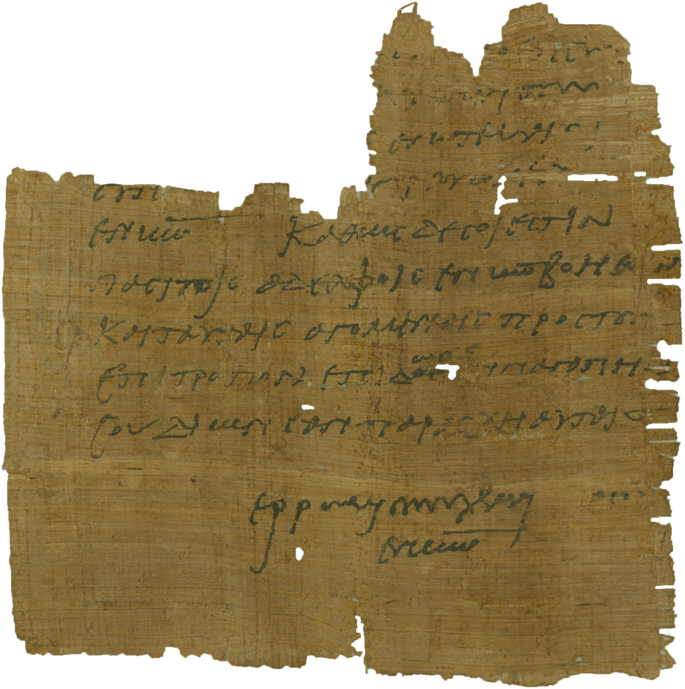|
In a third/fourth century Christian Greek papyrus letter, only the ending of which survives, a group of Christians, probably a church, is writing to another Christian or church about a group of women headed their way. These women appear to be in trouble. They are being transported to an epitropos, a "guardian" or "protector." Typically, guardians of women in Greek documents served as legal representatives who assisted them or acted on their behalf in a court of law. It appears, then, that these women were under arrest. It has been suggested that, based on the dating of this papyrus letter, the correspondence may reflect the circumstances of the Roman emperor Diocletian’s persecution of Christians. If that theory is correct—a fact that is not readily demonstrable—then these may have been Christian women who were possibly about to be imprisoned or severely persecuted, perhaps for not denouncing their faith. Before closing the letter, the writer implores the recipient to give his love (agape) to the women as he would to the “brothers.” Here is a translation of the letter followed by the original Greek text and an image of the actual papyrus (P.Got. 11): “I and those with [me] are greeting [you] in (the name of) the Lord. Just as it is your duty to help all the brothers in the name of our Lord, you shall give your love to these (sisters), too, who are being brought to the epitropos, through whatever you will offer them. I wish that you are well in the (name of the) Lord.” [ -ca.?- ] ἐγώ τε κ̣αὶ ο̣ἱ̣ | σὺν [ἐμοί σε προσ]α̣γορεύομ̣ε̣ν̣ | ἐν κ(υρί)ῳ. καθὼς δέ σοί ἐστιν | πᾶσι τοῖς ἀδελφοῖς ἐν κ(υρί)ῳ βοηθ[εῖ]ν | καὶ ταύταις ἀγομέναις πρὸς τὸν ἐπίτροπον ἐπιδ\ώσε̣ι̣ς/ [τ]ὴ̣ν ἀγάπην̣ | σου, διʼ ὧν ἐὰν παράσχῃ αὐταῖς. | ἐρρῶσθαί σε εὔχομαι | ἐν κ(υρί)ῳ. The name “Lord” is abbreviated as a nomen sacrum (“sacred name”), typical of early Christian scribal practice. I think the most interesting part of the request for aid is this statement: “Just as it is your duty to help all the brothers in the name of our Lord, you shall give your love (ἀγάπη) to these (sisters), too.”
“Agape,” or love, was a Christian virtue that became adopted by the earliest communities of believers. The apostle Paul says in his letter to the Galatians, “through love (διὰ τῆς ἀγάπης) become slaves to one another” (5:13). This kind of agape love became a staple of early Christianity and the writer of our papyrus is imploring the recipient to demonstrate his agape to these women in crisis “through what you will offer them.” It is not clear what kind of support the author had in mind and we can only wonder what the ultimate fate of these women was. But, as two scholars have suggested, “the crisis of the women will be one opportunity among many for the exercise of such good-will” (Judge and Pickering, 56). Papyrus letters like this one give us much better insights into the social mobility of Christians, with examples of contact with the State, in a time period in which the Christian church was suffering from persecution. Further reading:
0 Comments
Your comment will be posted after it is approved.
Leave a Reply. |

Available at Amazon!
Archives
June 2020
Categories
All
|
